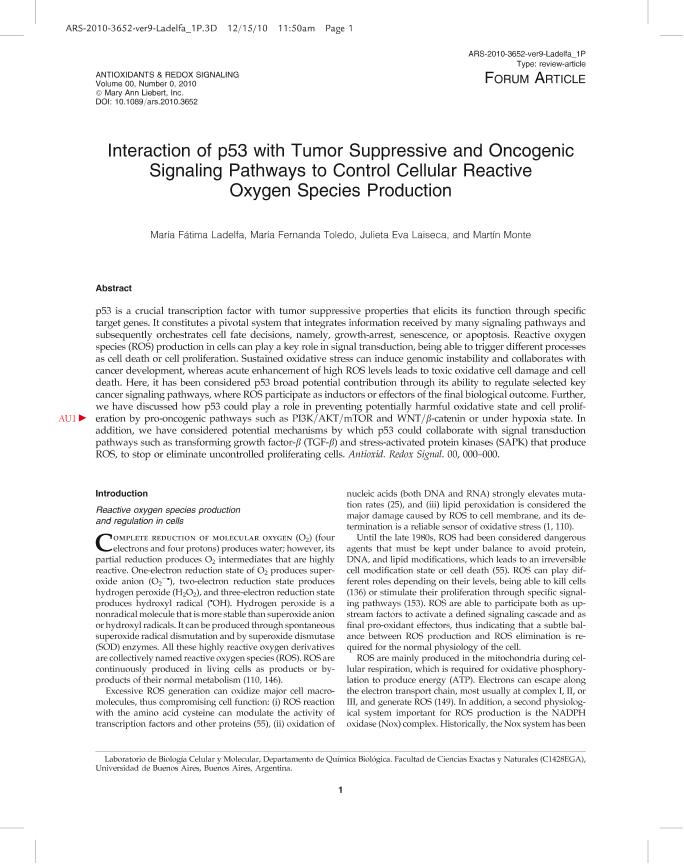Mostrar el registro sencillo del ítem
dc.contributor.author
Ladelfa, Maria Fatima

dc.contributor.author
Toledo, Maria Fernanda

dc.contributor.author
Laiseca, Julieta Eva

dc.contributor.author
Monte, Martin

dc.date.available
2018-12-19T17:38:41Z
dc.date.issued
2011-09
dc.identifier.citation
Ladelfa, Maria Fatima; Toledo, Maria Fernanda; Laiseca, Julieta Eva; Monte, Martin; Interaction of p53 with tumor suppressive and oncogenic signaling pathways to control cellular reactive oxygen species production; Mary Ann Liebert; Antioxidants & Redox Signaling; 15; 6; 9-2011; 1749-1761
dc.identifier.issn
1523-0864
dc.identifier.uri
http://hdl.handle.net/11336/66762
dc.description.abstract
p53 is a crucial transcription factor with tumor suppressive properties that elicits its function through specific target genes. It constitutes a pivotal system that integrates information received by many signaling pathways and subsequently orchestrates cell fate decisions, namely, growth-arrest, senescence, or apoptosis. Reactive oxygen species (ROS) production in cells can play a key role in signal transduction, being able to trigger different processes as cell death or cell proliferation. Sustained oxidative stress can induce genomic instability and collaborates with cancer development, whereas acute enhancement of high ROS levels leads to toxic oxidative cell damage and cell death. Here, it has been considered p53 broad potential contribution through its ability to regulate selected key cancer signaling pathways, where ROS participate as inductors or effectors of the final biological outcome. Further, we have discussed how p53 could play a role in preventing potentially harmful oxidative state and cell proliferation by pro-oncogenic pathways such as PI3K/AKT/mTOR and WNT/β-catenin or under hypoxia state. In addition, we have considered potential mechanisms by which p53 could collaborate with signal transduction pathways such as transforming growth factor-β (TGF-β) and stress-activated protein kinases (SAPK) that produce ROS, to stop or eliminate uncontrolled proliferating cells. © 2011 Mary Ann Liebert, Inc.
dc.format
application/pdf
dc.language.iso
eng
dc.publisher
Mary Ann Liebert

dc.rights
info:eu-repo/semantics/openAccess
dc.rights.uri
https://creativecommons.org/licenses/by-nc-sa/2.5/ar/
dc.subject
P53
dc.subject
Ros
dc.subject
Signalling
dc.subject.classification
Otras Ciencias Biológicas

dc.subject.classification
Ciencias Biológicas

dc.subject.classification
CIENCIAS NATURALES Y EXACTAS

dc.title
Interaction of p53 with tumor suppressive and oncogenic signaling pathways to control cellular reactive oxygen species production
dc.type
info:eu-repo/semantics/article
dc.type
info:ar-repo/semantics/artículo
dc.type
info:eu-repo/semantics/publishedVersion
dc.date.updated
2018-11-22T15:27:49Z
dc.journal.volume
15
dc.journal.number
6
dc.journal.pagination
1749-1761
dc.journal.pais
Estados Unidos

dc.journal.ciudad
Larchmont
dc.description.fil
Fil: Ladelfa, Maria Fatima. Consejo Nacional de Investigaciones Científicas y Técnicas; Argentina. Universidad de Buenos Aires. Facultad de Ciencias Exactas y Naturales. Departamento de Química Biológica. Laboratorio de Biología Celular y Molecular; Argentina
dc.description.fil
Fil: Toledo, Maria Fernanda. Consejo Nacional de Investigaciones Científicas y Técnicas; Argentina. Universidad de Buenos Aires. Facultad de Ciencias Exactas y Naturales. Departamento de Química Biológica. Laboratorio de Biología Celular y Molecular; Argentina
dc.description.fil
Fil: Laiseca, Julieta Eva. Consejo Nacional de Investigaciones Científicas y Técnicas; Argentina. Universidad de Buenos Aires. Facultad de Ciencias Exactas y Naturales. Departamento de Química Biológica. Laboratorio de Biología Celular y Molecular; Argentina
dc.description.fil
Fil: Monte, Martin. Consejo Nacional de Investigaciones Científicas y Técnicas; Argentina. Universidad de Buenos Aires. Facultad de Ciencias Exactas y Naturales. Departamento de Química Biológica. Laboratorio de Biología Celular y Molecular; Argentina
dc.journal.title
Antioxidants & Redox Signaling

dc.relation.alternativeid
info:eu-repo/semantics/altIdentifier/doi/https://doi.org/10.1089/ars.2010.3652
dc.relation.alternativeid
info:eu-repo/semantics/altIdentifier/url/https://www.liebertpub.com/doi/10.1089/ars.2010.3652
Archivos asociados
